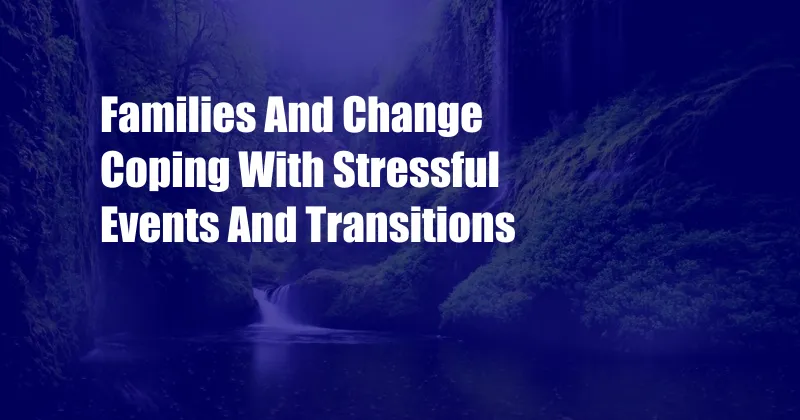
Families and Change: Coping with Stressful Events and Transitions
Families are dynamic systems, constantly evolving and adapting to change. While some changes are positive and welcomed, others can be stressful and disruptive, threatening the family’s stability and well-being. From major life events like divorce or relocation to everyday challenges like financial strain or illness, families must navigate a wide range of transitions that test their resilience.
Understanding the nature of change and its impact on families is crucial. By recognizing the challenges and developing coping mechanisms, families can emerge stronger and more adaptable.
The Impact of Change on Families
Change can affect families in numerous ways, both positive and negative. On the one hand, it can bring new opportunities for growth, learning, and enrichment. On the other hand, it can disrupt routines, strain relationships, and create feelings of uncertainty and anxiety.
The impact of change varies depending on the type of transition, the family’s resources, and the individual members’ coping styles. However, some common challenges associated with change include:
- Stress and anxiety
- Communication problems
- Conflict and tension
- Loss of stability
- Changes in family roles and responsibilities
Coping with Change as a Family
Successfully coping with change requires a multifaceted approach that involves both individual and family-level strategies.
At the individual level, it is important to:
- Acknowledge and accept change as a natural part of life.
- Identify and use personal resources for support, such as friends, family, or a therapist.
- Engage in self-care activities that promote physical and emotional well-being.
- Seek professional help when needed.
At the family level, effective coping strategies include:
- Open and honest communication: Encourage family members to share their feelings and thoughts about the change.
- Flexibility and adaptability: Be willing to adjust to new circumstances and make changes to family routines as needed.
- Collaboration and support: Work together as a team to solve problems and provide emotional support for each other.
- Emphasize the positives: Focus on the opportunities and potential benefits of the change, rather than dwelling on the challenges.
- Seek external support: If needed, reach out to community resources, such as support groups or family therapy.
Expert Tips for Coping with Change
Based on the latest research and insights from experts, here are some additional tips for coping with change as a family:
- Plan ahead: Anticipate potential changes and discuss strategies for应对ing them as a family.
- Be patient and understanding: Allow time for family members to adjust to the change and provide support during the transition.
- Focus on strengths: Identify the family’s strengths and use them to overcome challenges.
- Seek professional help: Don’t hesitate to seek professional guidance if family members are struggling significantly with the change.
By embracing these tips and strategies, families can navigate change and emerge stronger. Remember, change is a constant in life, but it doesn’t have to derail family harmony. With effective coping mechanisms and a commitment to support one another, families can turn transitions into opportunities for growth, resilience, and renewal.
FAQs about Families and Change
Q: What are the most common types of change that families experience?
A: Families encounter a wide range of changes, including major life events (e.g., marriage, divorce, childbirth, death) and everyday challenges (e.g., financial strain, illness, relocation).
Q: How can families prepare for change?
A: Families can prepare for change by anticipating potential transitions, discussing strategies for coping, and building strong family bonds.
Q: What are the signs of family stress due to change?
A: Signs of family stress include increased conflict, communication problems, changes in eating or sleeping habits, and emotional outbursts.
Q: What resources are available to families coping with change?
A: Families can access support from community organizations, support groups, family therapy, and online resources.
Q: How can families turn change into an opportunity?
A: By embracing change, focusing on strengths, and working together, families can use transitions as catalysts for growth, resilience, and positive family outcomes.
Conclusion
Families are constantly evolving and adapting to change. While change can bring challenges, it can also be an opportunity for growth and renewal. By understanding the impact of change and developing effective coping mechanisms, families can emerge from transitions stronger and more adaptable.
Call to Action: Share your experiences and insights about how families cope with change in the comments section below. Together, we can create a supportive community for families navigating the challenges of transition.